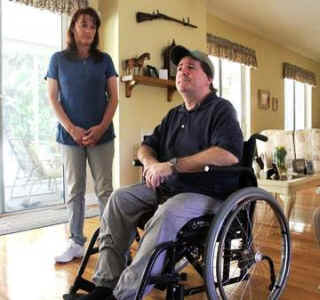|
Article Courtesy of The Tampa Tribune By Laura Kinsler Published March 21, 2014
DADE CITY — When Kim and John Whitt bought their house in Bayhead Landings five years ago, they thought they were getting their dream home.
The cheerful yellow house sat on 5 acres in one of the most tranquil settings in Pasco County. It faced Lake Hancock, and the lot had room for Kim’s vegetable garden. They could sit on the lanai and breathe in the scent of orange blossoms from the nearby groves. The wide-open floor plan was easy for John to navigate as he transitioned to life in a wheelchair following a horrific car crash.
point, without any problem,” board attorney Ellen Hirsch de Haan wrote. “There is no reason why he has to exit his car.”
When rain forced the board to relocate a meeting to the chairman’s house, Whitt said he sat in the driveway while the meeting took place inside.
“I was left out on the street,” he said. “That was so humiliating. I’ll never do it again. At that point, we’d been in the community less than a year.”
In another letter, one board member wrote that “myself and other neighbors would be willing to assist you from your vehicle.”
The Whitts declined the offer. “They offered to carry him,” Kim Whitt said. “But what if they dropped him? I don’t want him to go through this. This was supposed to be our dream home.”
The Whitts sued, accusing the association of violating the Fair Housing Act and the section of Florida law that requires homeowner association meetings to be open to all members. They won an emergency injunction — which forced the association to meet for a year in wheelchair-accessible locations. But the case was reassigned to another judge, who dismissed the Whitts’ claim and ordered them to pay the association $20,000 in legal fees.
Judge Linda Babb ruled that “there is no legal basis to support the plaintiffs’ contention that the open meeting provision of (the law) requires wheelchair accessibility.”
The association chairman declined an interview request.
When the Whitts’ appeal was denied, they decided to reach out to their local legislators and asked them in January to amend the law so it requires association meetings be “open and accessible” to all members.
Sen. Wilton Simpson, R-Trilby, said the Whitts’ plight resonated with him. When he got to Tallahassee, he drafted Senate Bill 1450, which already has passed one subcommittee and has been assigned to the Community Affairs Committee.
“I was trying to do the right thing for those folks,” Simpson said. “I didn’t know anything about the lawsuit. I just think anyone with a handicap should be able to attend their HOA meetings.” |
